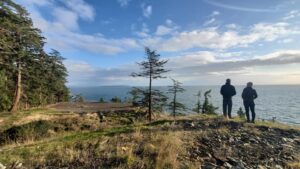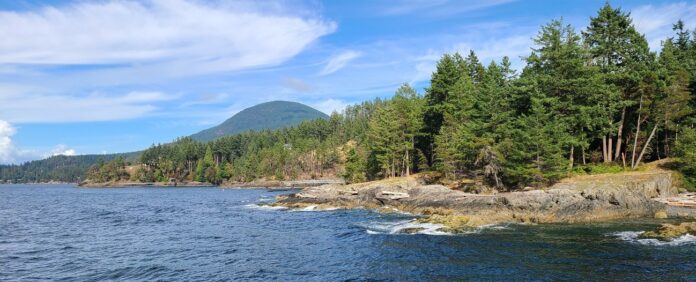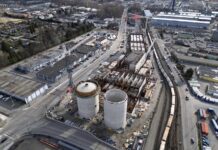METRO Vancouver plans to preserve a forested and waterfront property at Cape Roger Curtis on Bowen Island for public enjoyment as a new regional park that will incorporate both day use and overnight camping areas.
“Regional parks safeguard natural areas that are home to important ecosystems and contribute to the health and well-being of our residents by connecting them with natural spaces,” said Sav Dhaliwal, chair of Metro Vancouver’s Board of Directors. “Expanding the regional parks system is a Board priority and supports climate action and regional growth targets.”
Metro Vancouver has a conditional agreement to purchase 24 parcels of land on the southwest tip of the island, totaling 97 hectares that would make up the new park, for approximately $40 million, and the purchase agreement is in effect until spring 2023. Metro Vancouver is looking for other funding partners to help acquire and develop the regional park.
The park is located within Skwxwú7mesh úxwumixw/Squamish Nation territory, which has been stewarded by the Nation since time immemorial. Discussions are underway with Skwxwú7mesh úxwumixw/Squamish Nation about opportunities to work together, in a good way, on the development and stewardship of this new regional park.
“This regional park will make it easier for current and future generations to enjoy nature and help to preserve the coastal ecosystem, which Squamish Nation has stewarded since time immemorial,” said Skwxwú7mesh úxwumixw/Squamish Nation spokesperson and Councillor Sxwíxwtn. “We look forward to working in partnership with Metro Vancouver and Bowen Island Municipality to see how we can incorporate our language and culture in the park planning process.”
The preliminary concept for the park includes day-use picnic areas, trails with impressive viewpoints, access to the beach, and a supervised overnight camping area with three group camps, and around 50 walk-in/bike-in tent sites, 35 accessible drive-in tent sites, and 10 tent cabins. Recreational vehicle and trailer camping will not be permitted. If the land is successfully added to the Metro Vancouver regional parks system, planning and design will continue through 2023.
“I am beyond thrilled to see the potential for a new regional park that will protect public access to spectacular coastal forest and beach landscapes for generations to come,” said John McEwen, Chair of Metro Vancouver’s Regional Parks Committee. “With Metro Vancouver poised to welcome one million more residents in the next 30 years, and a significant increase in regional park visitation over the last two years, Cape Roger Curtis is a unique opportunity to help ensure all residents have access to regional parks.”
The park will be adjacent to Crown land that includes the headwaters of Huszar Creek and Fairy Fen Nature Reserve, which is owned by the Islands Trust Conservancy and managed by Bowen Island Conservancy, and the Wild Coast Nature Refuge, managed by the Bowen Island Conservancy. The park is also within the Átl’ka7tsem/Howe Sound UNESCO Biosphere Reserve. It would connect to nearby nature trails and a public beach and be accessible by active transportation and public transit.

“This new regional park initiative is incredible news, not just for Bowen Island, but for the entire region,” said Gary Ander, Mayor of Bowen Island Municipality. “Cape Roger Curtis holds some of the most unique ecological characteristics in the region — and this park enhances local efforts by the Bowen Island Conservancy and many islanders to protect the area. It will provide excellent recreational and educational opportunities for island and regional residents alike for years to come. The municipality looks forward to working with Metro Vancouver on this exciting initiative.”
Metro Vancouver has started the park planning process, which includes applying to Bowen Island Municipality for rezoning of the properties from rural residential to park and an amendment to the Official Community Plan.
In the past 50 years, Metro Vancouver’s regional parks system has grown from 3,835 hectares to over 13,800 hectares, with 23 regional parks, five greenways, two ecological conservancy areas, and two regional park reserves in communities from Bowen Island in the west to Langley and Maple Ridge in the east.












